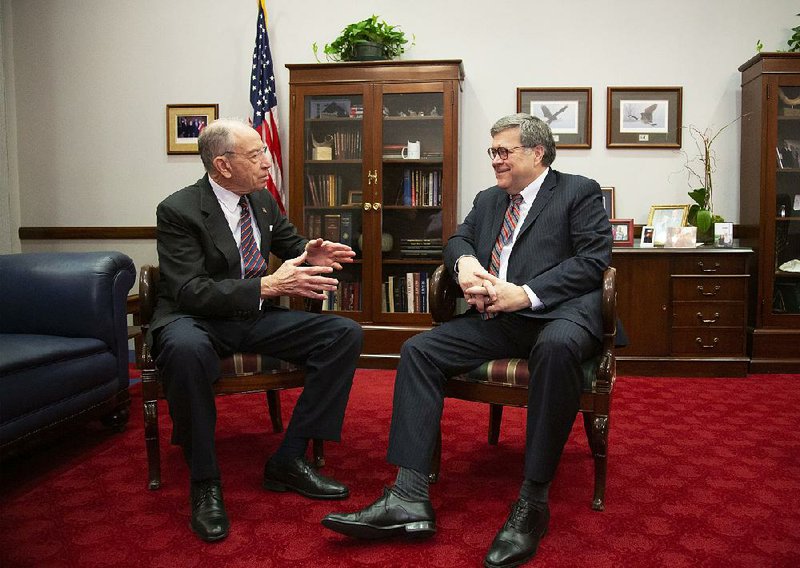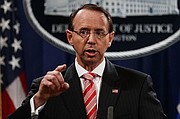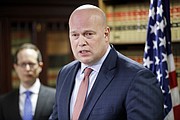WASHINGTON -- Rod Rosenstein, the deputy attorney general who had been overseeing the Russia investigation, is expected to leave the Justice Department after President Donald Trump's choice to run the department is confirmed, according to two administration officials.
Rosenstein has been a central figure in the investigation into Russian interference in the 2016 election and any ties to the Trump campaign -- he appointed special counsel Robert Mueller to take over the inquiry. He had always considered the deputy attorney general job as a two-year stint, one administration official said.
Trump nominated William Barr to be attorney general, after he fired his first attorney general, Jeff Sessions. Sessions recused himself from overseeing the Russia investigation in 2017, which is when Rosenstein stepped into that oversight role. His oversight lasted until the appointment of an interim attorney general in November. Confirmation hearings for Barr are scheduled to begin Tuesday.
Once it was clear that Sessions' time at the department was running out, Rosenstein quietly supported replacing him with Barr, according to a person who has discussed the issue with Rosenstein. He and Barr previously worked together at the Justice Department during the George H.W. Bush administration.
The departure creates uncertainty about the oversight of Mueller's team as it enters what may be its final months of work. But Barr moved quickly Wednesday to quell concerns that his arrival could endanger the probe, telling lawmakers during Capitol Hill visits ahead of his confirmation hearing that he has a high opinion of Mueller.
"He had absolutely no indication he was going to tell Bob Mueller what to do or how to do it," said Republican Sen. Lindsey Graham, the new chairman of the Senate Judiciary Committee.
If confirmed by the Republican-led Senate, Barr could be in place at the Justice Department by February. Rosenstein is expected to leave his position soon after that, though he is not being forced out, said a person familiar with the plans who was not authorized to discuss them on the record and spoke on condition of anonymity.
It is common for new attorneys general to have their own deputies, and Barr has told people close to him that he wanted his own No. 2.
White House press secretary Sarah Sanders said Wednesday that Rosenstein "had always planned to stay around two years" and that he would like to help with the new attorney general's transition.
"He's done a great job," she said.
Trump has been critical of Rosenstein, lashing out at him for approving an application to extend surveillance of a former Trump campaign associate, and saying that he is "conflicted" in his oversight role of Mueller's investigation.
And in September, after The New York Times reported that Rosenstein had previously made remarks about Trump's fitness to be president and had offered to secretly record conversations with him, Rosenstein's employment at the Justice Department appeared to be in jeopardy. At one point, Rosenstein, who denied the report, told senior White House officials that he wished to resign.
Trump chose not to fire Rosenstein at the time. But in November, he shared a meme on Twitter of his political opponents pictured in a jail cell, and Rosenstein was portrayed among them, next to Hillary Clinton.
Rosenstein in December joked about his unfavorable standing with Trump. At a conference where the president was to appear later, he said: "You let the president know that his favorite deputy attorney general was here."
As former U.S. attorney in Maryland for 12 years, serving under Presidents George W. Bush and Barack Obama, Rosenstein told lawmakers during his confirmation proceedings, "Political affiliation is irrelevant to my work."
A few months into his new job, Rosenstein found himself thrust into the middle of a political maelstrom that would permeate his entire tenure as deputy attorney general.
When Trump abruptly fired his first FBI director, James Comey, the president said he made his decision at the suggestion from both the attorney general at the time, Sessions, and Rosenstein. Trump cited a memorandum written by Rosenstein that was critical of Comey's handling of the final stages of the FBI investigation into Clinton's use of a private server. Comey's firing was met with bipartisan anger, directed at Trump and Rosenstein.
But as quickly as Rosenstein's stock may have plummeted over his role in Comey's ouster, it was restored when he named Mueller to take over the Russia investigation.
Mueller, in addition to the Russia inquiry, is investigating whether Trump tried to obstruct the Russia investigation. Since Rosenstein appointed him, Mueller has delivered more than 100 criminal counts against dozens of people and three companies.
WHITAKER TESTIMONY
After Sessions was ousted in November, supervision of the investigation fell to Matthew Whitaker, whom Trump chose to serve as acting attorney general.
Democrats have been wary of Whitaker, who declined to recuse himself from overseeing Mueller's probe. The Democratic leader of the House Judiciary Committee, Rep. Jerrold Nadler, on Wednesday called for him to appear before the panel on Jan. 29.
Whitaker, who had been publicly critical of the Mueller probe, resisted recusal from the start, and Justice Department officials recently made it known that he had rejected the advice of ethics officials to step aside.
Whitaker previously wrote to Nadler that he would appear before the committee in mid-February "so long as the Department is at least two weeks removed from a partial government shutdown."
Nadler rejected that proposed timeline in a letter to Whitaker on Wednesday.
"We are willing to work with you to identify a mutually identifiable date for your testimony, but we will not allow that date to slip past January 29, 2019 -- the day of the President's scheduled address to Congress, when we know you will be in Washington," Nadler wrote.
Nadler cited internal Justice Department guidance from 1995, when the Office of Legal Counsel wrote that, in the event of a government shutdown, "the Department may continue activities such as providing testimony at hearings if the Department's participation is necessary for the hearing to be effective."
Whitaker spoke with House Democrats on the phone in November and agreed to appear before the committee for testimony once Democrats took over control of the House.
The attorney general is dragging his feet, Nadler suggested in his letter, even though Democrats want to ask him about protecting the integrity of the special counsel, bills that address voting rights and immigration, and a host of other policy issues.
Whitaker has not appeared for testimony in the three months since he took over for Sessions.
Sessions last appeared on Nov. 14, 2017.
"It has been nearly 15 months since Attorney General Sessions testified before the Committee," Nadler wrote in the letter Wednesday. "It is past time for the Committee to conduct oversight of the Department."
Information for this article was contributed by Eileen Sullivan and Katie Benner of The New York Times; by Eric Tucker, Michael Balsamo, Mary Clare Jalonick and Darlene Superville of The Associated Press; by Matt Zapotosky and Devlin Barrett of The Washington Post; and by Griffin Connolly of Roll Call.
A Section on 01/10/2019


